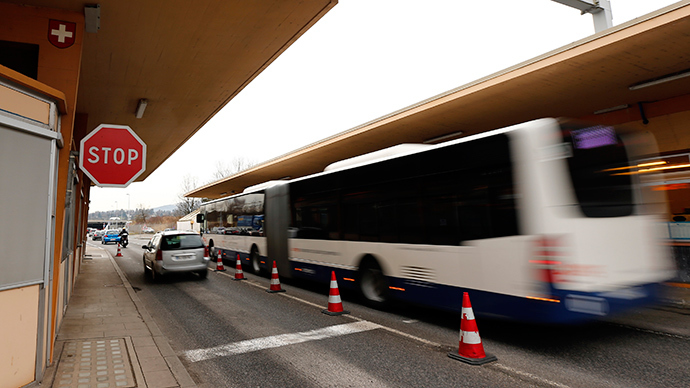Swiss syndrome: ‘Any independent country should have the right to control immigration’

Skyrocketing immigration pushed Switzerland to take “protective measures,” namely to rearrange the principle rules of free movement of persons, a move that the Swiss population has been demanding , Luzi Stamm from the Swiss People’s Party believes.
“[The] last years have shown [an increase] in immigration, and it was Switzerland’s answer to say, ‘Stop somewhere. We have a limit’,” Luzi Stamm, vice president of the Swiss People’s Party, told Sophie Shevardnadze on RT’s SophieCo show.
Switzerland has recently voted “Yes” on a referendum to limit immigration into the country. However, this initiative provoked criticism in the European Union, which promotes freedom of movement, and the EU even tried to impose various measures on Switzerland; for instance, it froze scientific grants and student exchange programs.
Luzi Stamm argues that the crucial point is that Switzerland is not a member of the European Union. 14 years ago, Switzerland did sign a treaty with the EU, allowing free movement, which was quite logical since the Swiss authorities wanted to join the EU at that moment, but the situation has changed.
“Now Switzerland has changed its direction and we do not want to become a member anymore; it seems to be normal that you rearrange immigration,” Stamm said.
“We want to return to controlling immigration again; [we need to issue visas for people] traveling across the borders. Free movement of persons is similar, but free movement [implies] you have the right to install yourself permanently in a country. And no other independent country would do this,” Stamm added.
Talking about the EU, Luzi Stamm says that it’s an EU decision to open borders and it could be fine for their own territory, so it’s the business of the EU, that’s the EU’s problem, but Switzerland is a different story.
“Look at the other European countries… It’s obvious they have free movement of people, but nevertheless they have problems with immigration also. If you talk to people from Great Britain, if you talk to Spain, to Italy – they have a problem with immigration from Romania, from the East, and immigration can cause problems. And I don’t see why an outside country like Switzerland should not have the right to control this,” Stamm said.
Luzi Stamm claims that “the substance of every individual country is to have control over immigration” and many countries like the US, Canada, Russia, China and Japan would never agree to free movement of people as they want to stay independent in the sense of regulating their immigration themselves.
“The Americans, the Russians, the Chinese, the Canadians – nobody would agree ‘we just open the borders for anybody who wants to come and live here’,” he said on the SophieCo program.
According to Stamm, such a policy aimed at curbing immigration won’t lead to Swiss isolation because immigration is a totally different issue. He emphasized that Switzerland remains one of the most open countries in the world, and people who really bring support and help to build up Switzerland will be allowed in, but the free movement of people cannot be controlled anymore. Stamm underlined the main problem as being skyrocketing number of immigrants.
“We do not want at all to make a difference between different countries; we do not want to make a difference between Portugal, between Estonia, between Greece and Ireland, all the members of the EU. Of course we want to treat them all the same, but if the number of immigrants is growing as much as it has grown [in the] last years, then I think if people from the EU hear the dimensions, they [will] understand what we are talking about and I think we have to find [a] means to limit [immigration],” he said.
The statements, views and opinions expressed in this column are solely those of the author and do not necessarily represent those of RT.
The statements, views and opinions expressed in this column are solely those of the author and do not necessarily represent those of RT.












